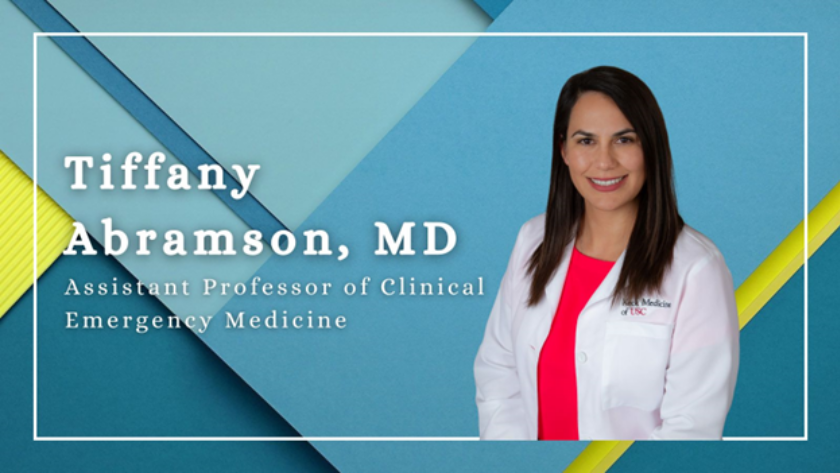An interview with Tiffany Abramson, MD, KL2 award recipient
Recipient of the SC CTSI Mentored Career Development in Clinical and Translational Science award (KL2)

Applications for the new cohort of KL2 scholars are due on September 16, 2022. For more details on how to apply, please visit this website: https://sc-ctsi.org/training-education/mentored-career-development-in-clinical-and-translational-science-program
Tell us a little bit about your experience so far in the KL2 program.
I am part of the newest KL2 cohort and our program just started this past month. I’ve already been blown away by the support the program has provided and the opportunities to meet and learn from people outside of my discipline. I am honored to be part of this program and am looking forward to the few years.
How did you first learn about the program?
I’ve been fortunate to have a fantastic mentoring team within the Keck School of Medicine Department of Emergency Medicine and the full support of my department’s chair. They have encouraged my research endeavors since I was medical student. One of my mentors, Elizabeth Burner MD PHD MSci, is a prior KL2 scholar and introduced me to the program. Her experiences and success motivated me to apply.
What initially got you interested in starting this program?
Although I have been involved with various types of research since I was in college, I had never had any formal research training. I participated in the SC-CTSI Introduction to Clinical & Translational Research Study Design Course as an EMS fellow. This course opened my eyes to some of the gaps in my training and also to my potential as a physician-scientist. As my research focus began to develop and my area of interest began to narrow, it became apparent that in order to ensure that my research was performed in a way that produced high quality, impactful results, I would need some additional training in methods and mentorship. Through the mentored career development grant, I am looking forward to the formal methods training, interdisciplinary meetings, and dedicated time to set the foundation for my research career.
What experience influenced you to dedicate your research to this area?
My clinical experiences at LAC+USC influenced me to explore this area. Everyday, I have the privilege to provide care to some of the most vulnerable members of our community. Their stories are humbling and I am honored to care for them. Through working with patients both in the emergency department and in the pre-hospital realm, I recognized limitations to our current system and hope to develop alternative care pathways to better optimize emergency healthcare for those who need it both.
Who or what is your biggest influence?
My parents. My mom and my dad are two of the hardest working people I know. For what they lacked in education, opportunity and resources, they made up for it with their work ethic. Hoping for a different path for me, they prioritized my education and as a result I became a first-generation college graduate. They always encouraged me to set my goals as high as possible and were supportive even when I didn’t reach those goals. The values and ethics that they raised me with drive me to be better every day.
What got you interested in emergency medical services? That must be an especially stressful space in medicine.
Prior to medical school, I volunteered as an emergency medical technician with a fire department. I loved the work but was always curious what happened to the patient after we dropped them off at the hospital. This ultimately led to me pursuing a career in emergency medicine. Then as an emergency medicine resident at LAC+USC, I would often wonder what had happened and what care my patients had received by EMS prior to arriving to the emergency department, recognizing the crucial impact that initial encounter could have on the patient. I came full circle and decided to go back to my pre-hospital roots and completed an EMS fellowship. Through my experiences, I learned that beyond the direct patient care that EMS provides, they have a unique window into our patients’ lives, play a role in our public health system and have untapped potential to address some of disparities in healthcare delivery.
What has been the most rewarding part of being a part of the KL2 program?
I am still at the start of the KL2 program, but am humbled to be surrounded by such amazing individuals -- the faculty, the KL2 alumni, and those in my current cohort. I am looking forward to learning from each other and collaborating with those outside my discipline to create impactful and far-reaching work.
Who else has been an integral part of your success in this program?
My family and the Keck School of Medicine Department of Emergency Medicine.
Without the support of my family, none of this would be possible. Raising a baby during a pandemic would have been challenging enough, but thanks to the immense and unwavering support of my husband, I was able to continue full steam ahead with my clinical responsibilities, research endeavors, and pursuit of being accepted in the KL2.
I’m also so incredibly grateful for the support to pursue this program from my chair, Dr. Carl Chudnofsky, the mentorship from the faculty in the EMS and research division, and the support from my colleagues with the department of emergency medicine.
Thank you for this opportunity to share a little bit about my story!



